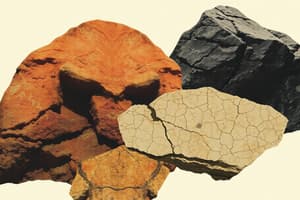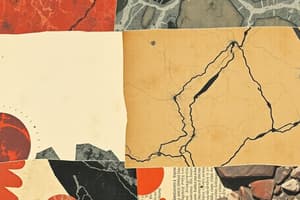Podcast
Questions and Answers
What type of rock forms as a result of volcanic activity at or near the earth's surface?
What type of rock forms as a result of volcanic activity at or near the earth's surface?
- Metamorphic rock
- Sedimentary rock
- Extrusive igneous rock (correct)
- Intrusive igneous rock
What type of igneous rock forms from the cooling and solidification of magma beneath the earth's surface?
What type of igneous rock forms from the cooling and solidification of magma beneath the earth's surface?
- Intrusive igneous rock (correct)
- Metamorphic rock
- Extrusive igneous rock
- Sedimentary rock
Do all extrusive igneous rocks have crystals?
Do all extrusive igneous rocks have crystals?
False (B)
Why do some igneous rocks have bubble holes?
Why do some igneous rocks have bubble holes?
What kind of rock forms when magma cools and solidifies?
What kind of rock forms when magma cools and solidifies?
What does the word 'igneous' mean in Latin?
What does the word 'igneous' mean in Latin?
What two factors affect the type of igneous rock that is formed?
What two factors affect the type of igneous rock that is formed?
What are three ways magma can form?
What are three ways magma can form?
What three factors affect the formation of magma?
What three factors affect the formation of magma?
How does the composition of the magma affect the temperature at which it solidifies?
How does the composition of the magma affect the temperature at which it solidifies?
Light colored igneous rocks that are rich in aluminum, potassium, silicon, and sodium are called?
Light colored igneous rocks that are rich in aluminum, potassium, silicon, and sodium are called?
Dark colored igneous rocks that are rich in calcium, iron, and magnesium are called?
Dark colored igneous rocks that are rich in calcium, iron, and magnesium are called?
The longer it takes for a rock to cool and solidify, the more time mineral crystals have to grow, giving the rock what kind of texture?
The longer it takes for a rock to cool and solidify, the more time mineral crystals have to grow, giving the rock what kind of texture?
The more quickly an igneous rock cools and solidifies will give it what kind of texture?
The more quickly an igneous rock cools and solidifies will give it what kind of texture?
Intrusive igneous rocks usually have what type of texture?
Intrusive igneous rocks usually have what type of texture?
Igneous rock that forms from lava that erupts onto the earth's surface is called?
Igneous rock that forms from lava that erupts onto the earth's surface is called?
Lava can either erupt or flow from long cracks in the earth's crust called?
Lava can either erupt or flow from long cracks in the earth's crust called?
When lava flows from fissures on the ocean floor where tension is causing the ocean floor to be pulled apart, what forms?
When lava flows from fissures on the ocean floor where tension is causing the ocean floor to be pulled apart, what forms?
When a large amount of lava flows out of fissures onto land, the lava can cover a large area and form a plain called a?
When a large amount of lava flows out of fissures onto land, the lava can cover a large area and form a plain called a?
What is the process in which sedimentary rocks are arranged in layers?
What is the process in which sedimentary rocks are arranged in layers?
Layers of rock are called?
Layers of rock are called?
What sedimentary rock can be formed in two different ways?
What sedimentary rock can be formed in two different ways?
Describe the two ways that limestone can be formed.
Describe the two ways that limestone can be formed.
What is the only sedimentary rock type that can be formed from things that were once alive?
What is the only sedimentary rock type that can be formed from things that were once alive?
Over time, grains of sand may be compacted and cemented together to form?
Over time, grains of sand may be compacted and cemented together to form?
When sediment is deposited in layers and compacted, what is formed?
When sediment is deposited in layers and compacted, what is formed?
Sedimentary rocks form at or near the earth's?
Sedimentary rocks form at or near the earth's?
The most noticeable feature of sedimentary rock is often its?
The most noticeable feature of sedimentary rock is often its?
Rocks or mineral fragments are called?
Rocks or mineral fragments are called?
Sedimentary rocks that form when rock or mineral fragments are cemented together are called?
Sedimentary rocks that form when rock or mineral fragments are cemented together are called?
Clastic sedimentary rocks can have what type of texture?
Clastic sedimentary rocks can have what type of texture?
Sedimentary rock that forms when minerals crystallize out of solution is called?
Sedimentary rock that forms when minerals crystallize out of solution is called?
Sedimentary rocks that form from the remains of plants and animals are called?
Sedimentary rocks that form from the remains of plants and animals are called?
What are the markings on sedimentary rocks that record the wave motion of wind or water called?
What are the markings on sedimentary rocks that record the wave motion of wind or water called?
Flashcards
Extrusive Igneous Rock
Extrusive Igneous Rock
Igneous rock formed from volcanic activity, characterized by fine crystals due to rapid cooling.
Intrusive Igneous Rock
Intrusive Igneous Rock
Igneous rock formed from magma cooling beneath the Earth's surface, resulting in larger crystals.
Bubble Holes
Bubble Holes
Voids in igneous rocks created by trapped volcanic gases during cooling.
Igneous Rocks
Igneous Rocks
Signup and view all the flashcards
Magma Formation
Magma Formation
Signup and view all the flashcards
Felsic Rocks
Felsic Rocks
Signup and view all the flashcards
Mafic Rocks
Mafic Rocks
Signup and view all the flashcards
Coarser Texture
Coarser Texture
Signup and view all the flashcards
Extrusive Igneous Rock
Extrusive Igneous Rock
Signup and view all the flashcards
Fissures
Fissures
Signup and view all the flashcards
New Ocean Floor
New Ocean Floor
Signup and view all the flashcards
Lava Plateau
Lava Plateau
Signup and view all the flashcards
Stratification
Stratification
Signup and view all the flashcards
Limestone Formation
Limestone Formation
Signup and view all the flashcards
Organic Sedimentary Rock
Organic Sedimentary Rock
Signup and view all the flashcards
Sandstone Formation
Sandstone Formation
Signup and view all the flashcards
Sedimentary Rocks
Sedimentary Rocks
Signup and view all the flashcards
Strata
Strata
Signup and view all the flashcards
Clasts
Clasts
Signup and view all the flashcards
Clastic Sedimentary Rock
Clastic Sedimentary Rock
Signup and view all the flashcards
Chemical Sedimentary Rock
Chemical Sedimentary Rock
Signup and view all the flashcards
Organic Sedimentary Rock
Organic Sedimentary Rock
Signup and view all the flashcards
Ripple Marks
Ripple Marks
Signup and view all the flashcards
Study Notes
Igneous Rocks
- Extrusive igneous rock forms from volcanic activity at or near the Earth's surface, resulting in fine crystals.
- Intrusive igneous rock results from the cooling and solidification of magma beneath the surface, leading to larger crystals.
- Crystals in extrusive igneous rocks may not always form if the cooling occurs too rapidly.
- Bubble holes in igneous rocks occur when volcanic gases are trapped during cooling, leaving voids.
- Igneous rocks develop when magma cools and solidifies, with the term "igneous" derived from the Latin word for fire.
- Factors influencing the type of igneous rock include the composition of the magma and the duration of cooling.
- Three ways magma can form: from heated rock, released pressure, or compositional changes.
- Formation of magma is affected by temperature, pressure, and composition.
- Composition affects the solidification temperature of magma, as different minerals have varying melting points.
- Felsic rocks are light-colored, high in aluminum, potassium, silicon, and sodium.
- Mafic rocks are dark-colored, rich in calcium, iron, and magnesium.
- Coarser texture in rocks results from slower cooling allowing mineral crystals to grow.
- Rapid cooling leads to a finer texture in igneous rocks.
- Intrusive igneous rocks typically exhibit a coarse-grained texture.
- Extrusive igneous rock is formed from lava that erupts onto the surface.
- Lava can erupt or flow from fissures, which are long cracks in the Earth's crust.
- New ocean floor forms when lava flows from fissures on the ocean floor where tectonic activity pulls apart the crust.
- A lava plateau is created when a large quantity of lava flows from fissures onto land and covers a vast area.
Sedimentary Rocks
- Stratification refers to the arrangement of sedimentary rocks in distinct layers known as strata.
- Limestone can form in two ways: organically from shell particles (coquina) or chemically when calcite crystallizes from a solution.
- Organic sedimentary rock is unique in forming from materials that were once alive.
- Sandstone can form when grains of sand are compacted and cemented together over time.
- Sedimentary rocks develop at or near the Earth's surface.
- Strata are the most recognizable feature of sedimentary rocks.
- Clasts are fragments of rocks or minerals found in sedimentary rocks.
- Clastic sedimentary rock results from the cementation of rock or mineral fragments.
- Clastic sedimentary rocks can have varying textures: coarse, medium, or fine-grained.
- Chemical sedimentary rock forms when minerals crystallize out of solution.
- Organic sedimentary rock forms from the remains of plants and animals.
- Ripple marks on sedimentary rocks indicate the wave motion of wind or water during sediment deposition.
Studying That Suits You
Use AI to generate personalized quizzes and flashcards to suit your learning preferences.




